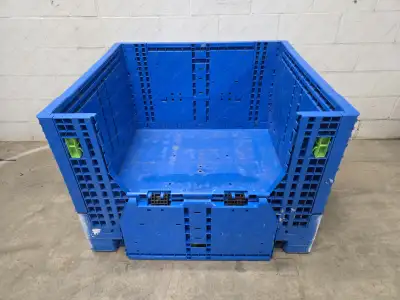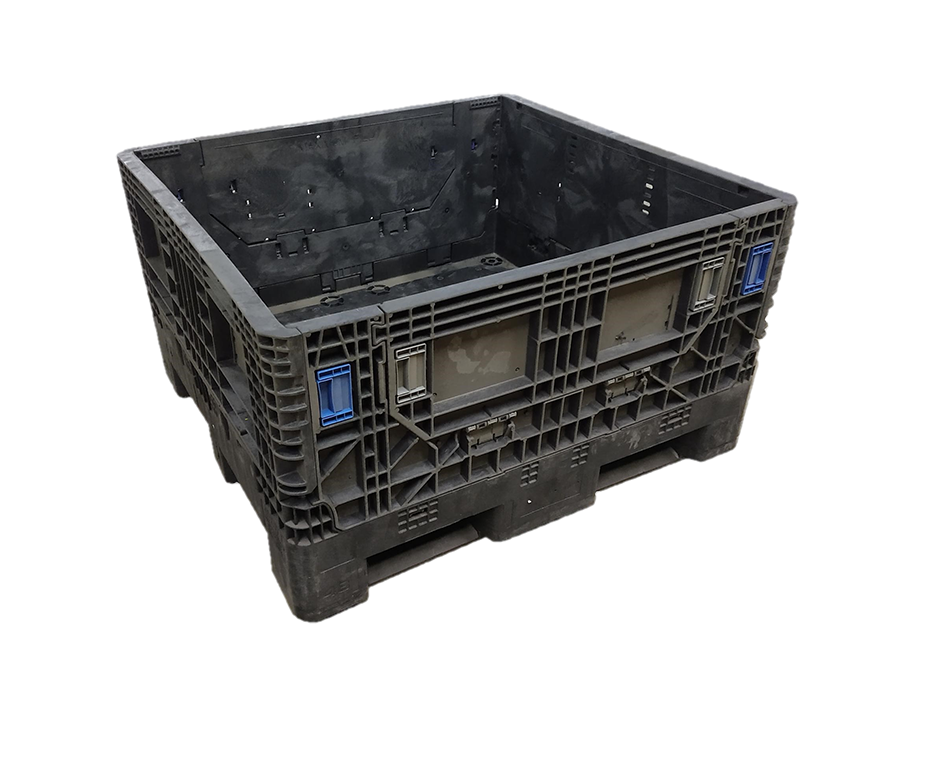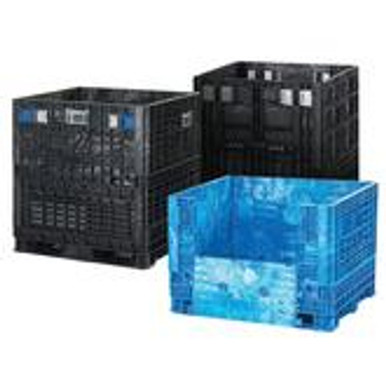Why Mass Containers Are Crucial for Cost-efficient and lasting Transport
Mass containers play an important duty in contemporary logistics. They assist in the reliable activity of big quantities of products, thus enhancing transportation processes. This technique not just reduces expenses however additionally reduces environmental impact with lower exhausts and waste generation. As sectors look for more lasting practices, the adoption of mass containers is ending up being increasingly substantial. What ramifications does this change hold for future logistics and supply chain management?

The Benefits of Using Bulk Containers in Logistics
Bulk containers change logistics by boosting efficiency and sustainability. These containers allow for the transport of large amounts of goods in a solitary journey, substantially reducing the variety of trips called for. This not just streamlines procedures but also reduces labor expenses linked with handling, loading, and dumping. In enhancement, mass containers are created to optimize space utilization within transport lorries, ensuring that more products can be shipped at the same time.
The standardization of bulk containers also streamlines the logistics procedure. With uniform dimensions, they can be quickly piled and saved, leading to boosted stockroom management. Additionally, bulk containers frequently include sturdy products that protect contents from damage throughout transit, thus reducing product loss and boosting general dependability. As an outcome, businesses can experience enhanced supply chain performance, inevitably resulting in raised profitability and consumer fulfillment. This combination of variables makes bulk containers a critical possession in contemporary logistics.
Ecological Effect: Decreasing Waste and Carbon Footprint
As markets increasingly prioritize sustainability, the adoption of bulk containers has become a vital technique for lowering waste and lowering carbon impacts. These containers reduce making use of product packaging products, such as boxes and plastic, thereby especially reducing general waste generation. By settling deliveries, mass containers enhance transport efficiency, enabling more items to be moved per journey. This decrease in journeys straight associates with reduced greenhouse gas emissions, contributing to a smaller carbon impact.
Mass containers can commonly be reused or recycled, additionally alleviating environmental effect. The longevity of these containers warranties they can endure multiple transport cycles, reducing the demand for single-use choices. used bulk containers. By simplifying logistics and advertising efficient source use, bulk containers not only sustain sustainable practices yet also motivate industries to align with worldwide ecological goals. Inevitably, their execution mirrors a commitment to ecological stewardship and liable resource administration
Expense Cost Savings: Just How Mass Containers Lower Transport Expenses
While several business seek ways to improve their lower line, the usage of bulk containers provides a considerable possibility for lowering transport expenses. Mass containers take full advantage of the volume of products delivered, enabling companies to deliver bigger amounts simultaneously. This efficiency lowers the variety of trips called for, directly reducing fuel costs and lessening labor expenditures linked with loading and dumping.
Furthermore, mass containers usually include structured designs that maximize area application within transportation lorries. This implies fewer voids, causing extra effective use of offered capacity. The resilience of bulk containers can decrease the threat of product damage during transportation, guaranteeing and decreasing losses that more products arrive undamaged.
Enhancing Supply Chain Efficiency With Mass Storage Space Solutions
Bulk storage space remedies play a vital function in enhancing supply chain efficiency by enhancing supply administration. By combining products right into less, larger containers, companies can significantly minimize managing prices connected with regular transfers and processing. This streamlined approach permits for far better monitoring and management of supply, ultimately causing improved functional performance.
Structured Inventory Administration
Reliable inventory administration is crucial for maximizing supply chain procedures, particularly when companies take on bulk storage space options. These solutions make it possible for services to keep greater stock levels while reducing the frequency of replenishment. By consolidating materials right into mass containers, firms can streamline their supply processes, reducing the intricacy linked with tracking numerous smaller sized plans. This method helps with precise inventory matters and enhances projecting precision, allowing for even more enlightened decision-making. Additionally, mass storage space services simplify warehouse organization, making it easier to situate and access products when needed. As an outcome, companies can accomplish a much more efficient stock turnover price, eventually improving total supply chain efficiency and lowering the probability of stockouts or overstock circumstances.

Reduced Handling Costs
The implementation of mass storage remedies not just improves stock management but additionally significantly minimizes dealing with prices across the supply chain. you can try this out By settling products into bulk containers, companies minimize the demand for regular handling and transfer between different storage space and transportation units. This technique reduces labor costs connected with loading, dumping, and relocating smaller plans. Furthermore, bulk storage minimizes the regularity of shipments, leading to lower transport costs and lowered gas usage. As a result, companies can optimize their logistics operations, enabling a more efficient appropriation of sources. Eventually, lowered managing expenses add to improved overall supply chain efficiency, cultivating an environment that supports both sustainability and financial stability.

Convenience of Bulk Containers Across Various Industries
Although several sectors have distinctive demands for transport and storage, mass containers have actually emerged as a flexible solution that satisfies a large range of demands. These containers, ranging from huge containers to specialized containers, can accommodate diverse products, consisting of liquids, granules, and powders. In the farming field, bulk containers facilitate the transport of grains and fertilizers, while the food and drink sector uses them for active ingredients and ended up products. The chemical sector depends on bulk containers for securely transferring hazardous products, making certain compliance with safety guidelines. Additionally, building and construction firms take advantage of bulk containers for transferring accumulations and other products. Their versatility includes numerous modes of transport, consisting of vehicles, trains, and ships, enhancing logistical performance. This adaptability not just simplifies operations throughout various sectors but also promotes sustainability by reducing packaging waste and optimizing area en route. Bulk containers play an important function in modern supply chain management.
Future Trends in Mass Container Use and Sustainability
The future of mass container usage is progressively formed by cutting-edge products development that improves sustainability. Furthermore, automation in logistics promises to simplify procedures, lowering waste and improving efficiency. Accepting round economy methods will certainly even more revolutionize just how bulk containers are developed, made use of, and recycled, promoting an extra sustainable transport landscape.
Innovative Materials Advancement
As sectors increasingly prioritize sustainability, ingenious products development wholesale containers becomes a considerable element in enhancing environment-friendly transportation remedies. Producers and researchers are discovering eco-friendly plastics, recycled compounds, and lightweight steels to minimize ecological impact. These materials not just decrease waste yet likewise improve gas efficiency by decreasing the general weight of containers. Furthermore, improvements in clever products, which can adapt to varying conditions, improve the durability and capability of bulk containers. The combination of these ingenious materials lines up with round economic climate concepts, advertising reuse and recycling. As the demand for sustainable methods grows, the growth of such materials will play an essential role in shaping the future of bulk container use in logistics and transportation.
Automation in Logistics
Significant advancements in automation check here are positioned to transform logistics and the utilization of mass containers, enhancing sustainability in transportation. Automated systems, including drones and autonomous cars, are streamlining the activity of bulk containers, minimizing the reliance on standard fuel-powered transport. These innovations maximize directing and filling processes, boosting and decreasing empty miles gas efficiency. Additionally, automated inventory administration systems improve monitoring and surveillance of bulk containers, making sure much better source allotment and decreased waste. The combination of the Web of Things (IoT) allows real-time data evaluation, allowing aggressive decision-making that aligns with sustainability goals. As automation proceeds to progress, it is expected to drive even more technologies in bulk container use, inevitably sustaining even more sustainable logistics practices and lowering the environmental effect of transport.
Circular Economy Practices
Improvements in automation are setting the phase for an extra incorporated method to circular economy methods in the domain of mass container use. As sectors progressively welcome sustainability, mass containers are being created for longevity and reusability. This shift not just minimizes waste however likewise improves source performance. Companies are taking on strategies such as closed-loop systems, where utilized containers are accumulated, reconditioned, and reestablished right into the supply chain. Additionally, wise innovations track container life cycles, facilitating far better monitoring and lowering environmental effect. The you can check here collaboration between manufacturers, logistics suppliers, and end-users is necessary in developing criteria for sustainable container usage. used collapsible bulk containers. Future trends indicate a growing focus on products that are biodegradable and recyclable, additional enhancing the circular economic climate's principles wholesale transportation

Frequently Asked Questions
What Materials Are Bulk Containers Usually Made From?
Mass containers are typically built from long lasting products such as high-density polyethylene, light weight aluminum, cardboard, and steel. These products offer stamina, adaptability, and security, making them appropriate for transferring numerous products in different sectors efficiently.
How Do I Pick the Right Size Mass Container?
Choosing the best size bulk container includes evaluating the volume of materials to be moved, thinking about dealing with equipment compatibility, and evaluating storage area needs. Correct size assurances efficiency in transport and decreases waste throughout delivery.
Are Mass Containers Reusable or Recyclable?
Bulk containers are commonly recyclable, made for multiple trips, improving sustainability. Several can likewise be reused, depending upon the materials utilized. Selecting recyclable options better reduces and sustains environmental objectives waste in transportation methods.
What Safety Rules Put On Mass Container Transport?
Security policies for mass container transport include compliance with the Division of Transport standards, correct labeling of hazardous materials, structural integrity assessments, and adherence to weight limits to ensure safe handling and protect against accidents during transportation.
Exactly How Can Services Transition to Making Use Of Bulk Containers Successfully?
Businesses can transform to bulk containers by assessing present logistics, training staff on handling, buying ideal equipment, optimizing supply management, and collaborating with providers to guarantee compatibility and performance throughout the supply chain.
As industries increasingly focus on sustainability, the fostering of bulk containers has emerged as an essential approach for reducing waste and reducing carbon footprints. By settling materials into bulk containers, companies can improve their stock processes, minimizing the complexity connected with tracking several smaller sized packages. As markets progressively focus on sustainability, ingenious materials growth in bulk containers emerges as a substantial element in boosting environmentally friendly transportation solutions. Automated systems, including drones and self-governing automobiles, are enhancing the motion of bulk containers, decreasing the reliance on conventional fuel-powered transportation. In addition, automated stock administration systems enhance tracking and monitoring of bulk containers, making sure far better resource allocation and minimized waste.